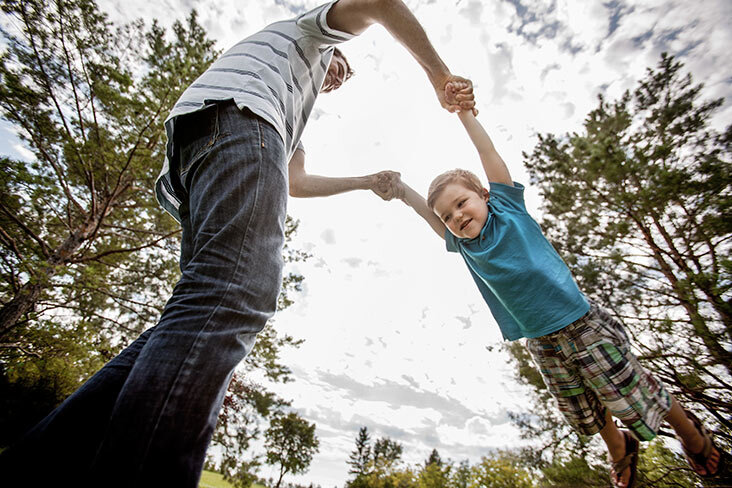God’s Hope for Men
Earlier this month, our writers responded to the devastating news of the Umpqua shooting, frustrated and angry that such acts are becoming more and more common, and hoping to find a way to make them stop. With the majority of perpetrators in mass shootings being male, the discussion hit very close to home for our male writers and our writers who are mothers of young boys. We asked ourselves, what is God’s hope for men, and how can we help our fellow men, present and future—and our loved ones of both genders—to never feel the need to add to these statistics?To answer these questions, we looked to our own relationships with family and friends, to personal experience, and to the bigger picture offered by the Divine Principle. This process of reflection helped us resolve to do the following in the way we raise our kids, raise ourselves, and nurture our relationships:Give Kids Permission to FeelWith their siren-like screams, flailing limbs and apparent inability to understand reason, young children’s tantrums are a ubiquitous source of frustration, but what we sometimes forget is that they are also critical teaching moments. Brené Brown writes, “Most of us were never taught how to hold discomfort, sit with it, or communicate it - only how to discharge or dump it, or to pretend that it’s not happening.” When we rush to tell children “It’s ok, don’t cry,” (and unfortunately, there’s a tendency to do this more often to boys) we unknowingly teach that some emotions don’t deserve to be felt. Alternatively, coaching children through tough moments helps them learn emotional intelligence - meaning the ability to identify and effectively respond to the emotions we and those around us feel. Emotional intelligence gives people the tools they need to be kind, considerate, and comfortable with emotions, which can help in avoiding destructive thought processes. Teach a Love of KindnessIn our early childhood, kindness comes fairly easily, but as we mature we are not always quite so eager. It’s hard to love someone who hurts you, and we all eventually experience that. (In fact, many argue that a common link among those who commit mass shootings is “aggrieved entitlement,” or resentment towards being let down by society.) Until then, we can show those younger than us, through our own example, that simply choosing to be kind brings a far deeper peace than whatever results from that choice - which is especially helpful when our kindness isn’t so noticed or appreciated. The Divine Principle educates us that true love gives without expecting anything in return, and if we guide young ones toward this truth, then when hurt inevitably arrives, the seeds of unconditional love and forgiveness will already have been planted. Be a Solution Even When You Don’t Have an AnswerIn her own response to the Umpqua mass shooting, author Elizabeth Gilbert encouraged readers to seek out someone in their own lives who is suffering, and “Go sit with that person for a while. Don't try to solve their life, or answer for God, or offer dismissive "reasons", or try to fix the whole world. Just say, "I don't know. But I will sit with you through this.”” Sometimes, this is all we can do, and more often than we know, it is enough. Be (and Find) Realistic Role ModelsNo matter how old we are, role models always play a huge part in what we do. They give us something to aspire toward as well as an understanding of the means by which we can follow through on our goals. Yet there’s a plethora of bad influences in the world of the media. Men, in particular, are given damaging images of what it means to be a man in just about all forms of media—be it the playboy millionaires, decadent rock stars or corrupt film heroes. While we try and find ourselves in role models, we risk coming across some downright destructive idols. In our article on the Umpqua incident, DP Life writer Phil Brown shared his experience looking up to James Bond, and concluded that if young men define masculinity at its extreme as synonymous with violence, this false idea can potentially lead down a destructive path. He shared the idea that we need to develop a radar for positive and realistic role models—ones who consider strength to mean a strength of heart more so than body. Create Encouraging and Positive RelationshipsOur relationships define us, especially those with our siblings and friends. Just think what a truly positive relationship can do for our physical and emotional health. We may underestimate the power of reaching out to a sibling or friend, but it can give someone a sense of validation and connection even if we simply listen to the goings on in their day, swap opinions, show encouragement and respect for their accomplishments, express sympathy by the downs they experience and engage in pensive thought about the deeper questions in life. We need to stop creating the invisible line between me and “them,” resulting in society-wide loners. Rather, if we saw ourselves, our siblings and friends as all in it together, then we might be able to go through life with more emotional security and accountability. These ideas are obviously part of a much longer, complicated conversation. What are your thoughts, and how have you supported your loved ones in their growth and development?





